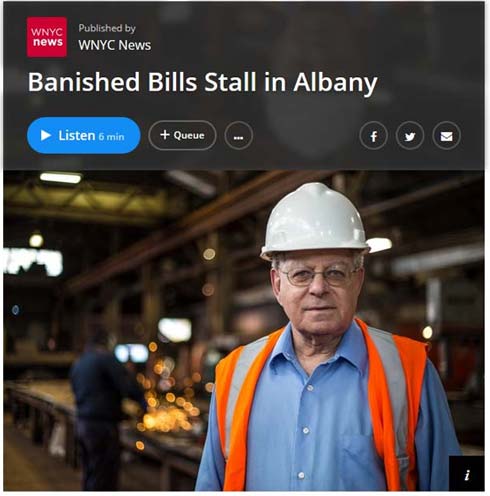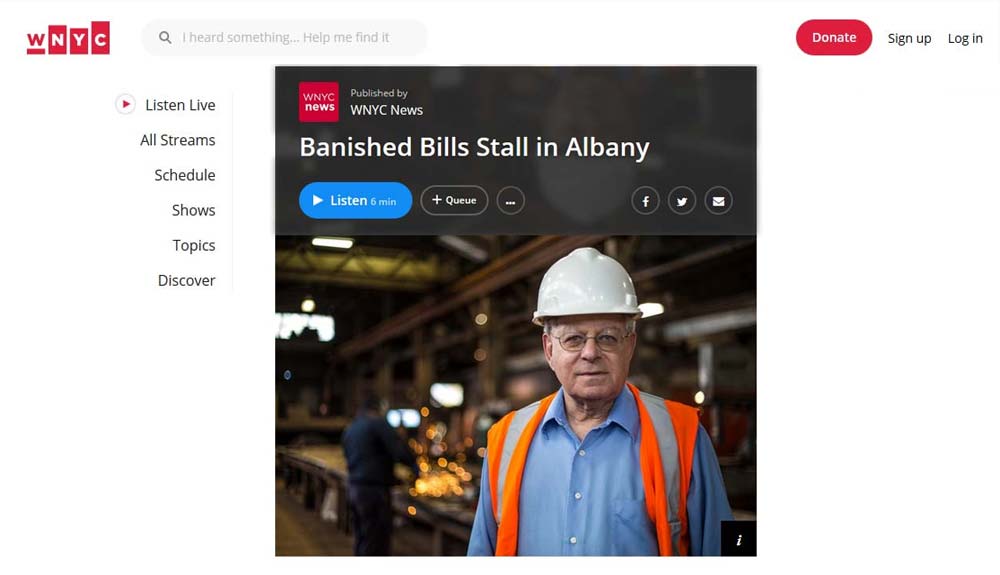President Goldberg explains legislative goals regarding safety, unions and workers
 By Karen Rouse FromWNYC
By Karen Rouse FromWNYC
Legislators in Albany introduce more than a thousand bills in the Assembly and Senate each year. Last year, about 700 made it to the governor’s desk to be signed or vetoed. But other bills seem to hang in limbo, sometimes for years, unable to get to the floor in either house for debate or a vote.
Many are popular, like one to make mixed martial arts a legal sport in New York state. Elite athletes have even gone to Albany to plead for the state’s blessing.
But it, and others, continue to languish, for reasons not necessarily tied to their popularity or merits.
Rather, the leader in the Senate and in the Assembly has power over what bills move forward, and which get blocked from the floor. And they are slow to act on bills that don’t further the political goals of their party. A bill can be stalled because a big donor opposes it, or because a member of the majority party doesn’t want to have to vote and take a public position on the bill, or because the leader of the Senate or Assembly doesn’t like the bill for any other reason.
Larry Norden is a director at the Brennan Center for Justice at New York University, which advocates for open government. He says the stalling of bills hurts democracy.
In some cases, Norden says, the leader stifles a bill as a way to protect members of his party who don’t want to take a position on a controversial bill.
“A majority of them may publicly say they’re in favor of a bill, but behind closed doors, maybe a majority of them aren’t,” Norden said. “Maybe there’s something … that their donors don’t want to see them do even if their constituents do.”
But Norden says those reasons should not interfere with the public’s right to hear the issues out.
“We’re supposed to have a democratic system where if there’s a strong majority in favor of something, at the very least, you get a full hearing and a vote on it.”
One bill that has been lingering for years would reform the state’s century-old scaffold law. It holds employers and property owners 100 percent liable when a worker falls from a ladder or scaffold — or any other ‘gravity-related’ fall — if the owner or property owner contributed in any way, like forgetting to put a cone out.
Arthur Rubenstein, the president of Skyline Steel, a fabricator in Brooklyn, says it can hundreds of thousands of dollars in insurance costs to large projects.
“In New York, they’re able to sue the owner and because of the absolute standard of negligence in the scaffold law, the owner automatically loses,” he said.
Assemblyman Joe Morelle, the Democratic majority leader, says an overhaul is long overdue. He’s proposed legislation that makes employers liable only for their contribution to the fall — such as a failure to provide safety gear to the worker. The worker would be liable for his or her role, such as a failure to properly use safety equipment.
The bill has bounced from the labor committee to the judiciary committee over the last five years, but it has yet to get released to the full Assembly for a public debate, or even a vote. Supporters of the reform bill blame the heavy influence of trial lawyers groups, which have poured millions of dollars into lobbying in Albany for various causes, including opposing efforts to change the scaffold law.
Evan Goldberg, president of the New York State Trial Lawyers Association, says the attorneys are fighting to protect workers from unscrupulous employers, not line their own pockets.
“Our motivation is to provide safe work sites for the people who need it most,” Goldberg said, “the unions, the trade organizations, everybody.”
Advocates of reforming the scaffold law said the trial lawyers’ influence has kept the leaders from moving a legitimate bill forward.
Former Assembly Speaker Sheldon Silver — himself a trial lawyer — received tens of thousands of dollars in campaign contributions from the association over the years, according to the watchdog website Follow the Money. And while he ruled over the state Assembly, the scaffold reform bill never got to the floor.
Assemblyman Carl Heastie took over as speaker last year after federal corruption charges forced Silver out of office. But a new leader in the Assembly doesn’t appear to change the odds of the Morelle’s bill passing.
Heastie said the members of his party are not in support of reform.
“People want to make sure that if a worker is injured, that they are able to get what they deserve if they have to be compensated,” he said.
By the way, Heastie’s close friend and paid political consultant, Patrick Jenkins, is also a lobbyist for the trial lawyers.
A small band of Republican Assembly members — they’re the minority party — is trying to make it easier to get around the decisions of the leader. Assemblyman James Tedisco is floating legislation that would force a debate and vote on any bill that has the support of at least 76 out of the 150 Assembly members.
He has a handful of supporters. The Speaker and the Majority Leader are not among them. And without their support, Tedisco’s bill is probably not going anywhere.

